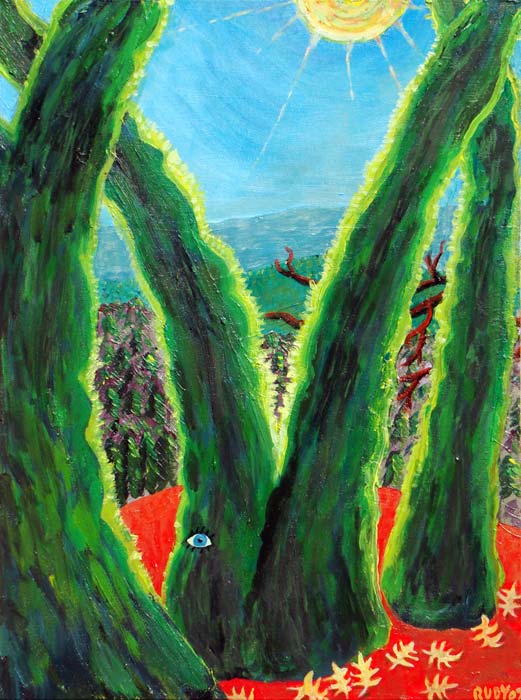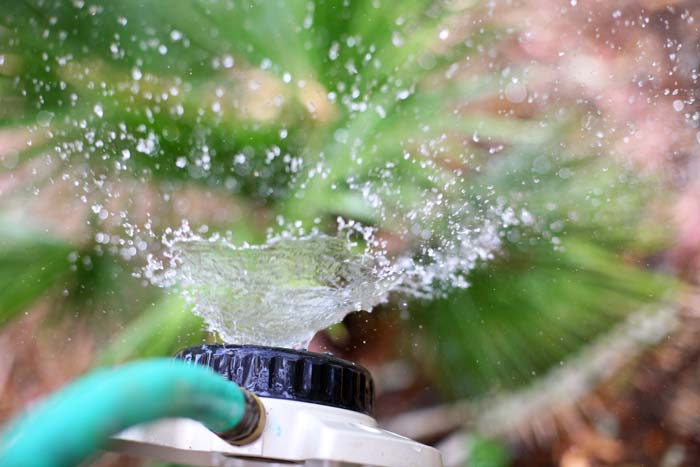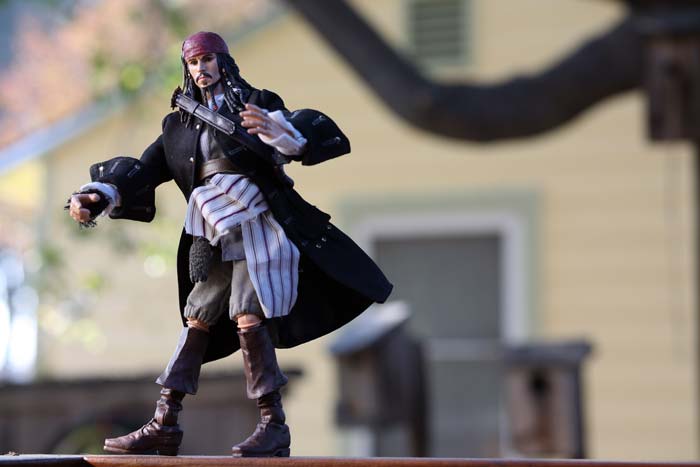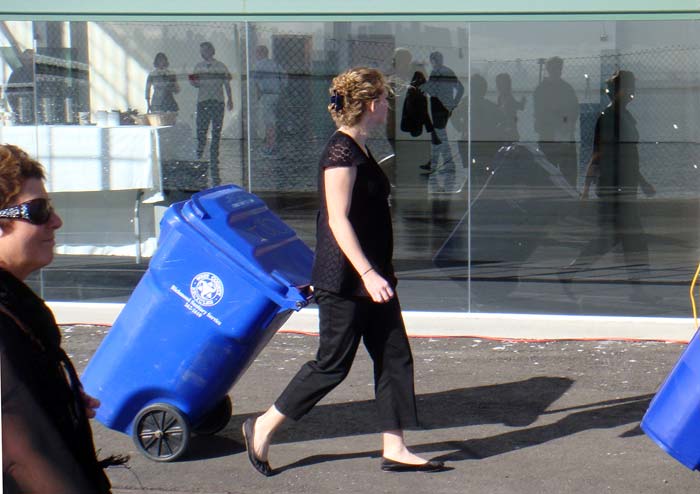
Growth Industry
by Adam Rothstein

After many years of viewing construction sites from the other side of such a fenced-in plot, hedged by the already completed buildings and their occupants in such a bustling part of the city, walking into one for the purpose of joining in the labor was a bit surreal. It was almost as if a passenger on a plane who suddenly decided to sit in the pilot’s seat. Walking past the support trailers on the edge of the site overlapping the sidewalk, through the group of workers idly smoking cigarettes and kicking stray rocks and clumps of dirt, past the giant liquid stills being warmed by a trio of technicians in white lab coats—even amid all this activity it was easy enough to find the large man who was obviously in charge. So far, everything was as they described. Jack felt a bit of the excitement that was manifest in the others, who hid their anticipation in their jocular familiarity and disengaged laziness of the workday. But Jack felt a bit of nervousness too, at what was about to unfold. They said everything would go just fine, of course. The pills had been swallowed exactly an hour ago as they instructed. The rest, they said, would be easy. But seeing as “the rest” was a potential “first time ever”, nobody knew exactly how easy it would or would not be. Nor did anybody know what it would feel like to fail. And besides all that, Jack had bills to pay. No success meant no pay.
Dressed in coveralls with the GroTech logo printed on the back, the foreman was arguing with his opposite number from flatbed unloading team.
“I’m just saying, if these foundations are a week past date, and I just ignore that fact, put them in the ground, and throw twenty-thousand dollars of stims on them, then it’s my ass out on the street. I hate paperwork as much as you do, but the born-date is the born-date, and I’m not signing for dead foundations.”
“But I’m telling you, that label’s just a typo. If those were the dates, you’d be totally right. But I saw the dates myself when we left the depot this morning, and that’s what it says on the form. See? Just as ordered: premium Blurhass stones—top of the line, direct from Blurhass’ tanks himself. These foundations are no more than ninety-six hours old, as of six o’clock this morning. My word on that. They wrote the wrong number on the label. You know these grow-boys; their eyes are so full of carbon they can barely read.”
“Yeah, that’s what I’m worried about—there’s a big gap between the genius himself and his employees. And like I said, I’m responsible to be one-hundred percent sure.”
“Why would they send out old foundations? As soon as the date’s up, they go right back into the tanks for recycling. If they make mistakes like that it would be worse for their business than it is for yours.”
“Yeah, worse for their company, but worse for my job. They fire me, they hire someone else. Those grower guys get canned, they find work in half a minute.”
“Look, it’s your call. If you don’t want ‘em, don’t sign. But we got a schedule, so either you sign and my boys unload, or we go to the next stop.”
The site foreman looked around at the scene he was trying to control. The lab coats stood waiting, the corner of their eyes focused on their dials. The laborers were on their third cigarettes, hooting with laughter about something. The foreman seemed to see Jack standing there for the first time.
“Fine, fine. Chems are warmed and everyone’s already on the clock. Union says they gotta work at least four hours, so might as well have ‘em doing something.”
He signed the clipboard, and the truck team began readying the winch to lower the eight-foot off-white beams onto pallets waiting at the edge of the site.
The foreman turned, cursing under his breath.
“You must be the new guy with no experience. Figures they’d send you to me. Your name’s Mark?”
“Uh, no, Jack.”
“Jack… right.” He looked inquisitively at the new recruit for a moment, and then over at the work crew, who had begun to wrestle with each other in idleness. “Okay Jack, welcome to the site. You learn quick and work hard, we won’t have any problems here. You have any growing experience at all?”
“Nothing really, just some gardening. Amateur, food hobby stuff.”
“Well, that’s better than most. Some guys never even watered a tree before, act like they’re putting out a fire when they get behind a hose.”
The conversation lasted only the time it took to walk over to the restless workers. The foreman raised his voice as a way of introduction.

“Alright guys, this is Jack. Help him out, huh? Make sure he doesn’t kill anything or anyone on the first day.”
Quick introductions went around to and from the other five guys wearing hardhats, boots, and dirty coveralls.
“Okay, assholes!” the foreman shouted. “Let’s sprout this baby. The bones are coming off the truck now, which means you guys should be already getting them in the ground. Spots are all marked. I want to start feeding before lunch time—let’s not make the chem guys wait around.” There was general grumbling as they hustled over to the bones.
The foundation bones were just as heavy as they looked. Jack worked with one massive man, with fewer teeth than feet in height, named Tiny, and an older wiry guy with a shaved head named Alan, or Dave or something. They bantered back and forth through their trips back and forth to the stack of lime-white beams.
The old guy acted like an expert. “So you never grown before, right Jack? It’s not too bad really. I’m old enough to have worked on a few conventional sites back in the day. Same amount of work really, but less chance to screw things up now. White coats handle that business off in a lab somewheres.” He nodded his head towards the three men in the coats, one of which was now standing on the top of a tank, feeding a slender tube into the top and reporting back to the other two below.
Tiny grinned, stupidly. “Yeah, you’re old enough. You probably should have been buried back in one of them stone pits. Like under a pyramid or something.” He gasped at his joke, teeth rattling around.
“Can it, Tiny! At least back then you didn’t have to worry about mutagen-toxic crap! Worse thing that could happen is you catch your hand in a saw, loose a few fingers.”
“Saws on a site! Like you’re a surgeon! Haw!”
“Don’t follow him to close,” the old timer whispered to Jack, “he may be a big sucker but I’ll bet he drinks that stuff in the tanks if no one tells him not to. They don’t get that big without help. Not that big and dumb.” The thin face smiled. Jack could see he was missing a few teeth in the back as well, filled with off-white composites.
They slid a bone into the bottom of its ditch, and headed back for another. Around the wide, deep circular ditch dug in the dirt the men alternated horizontal and vertical beams, building an inverted Stonehenge in the center of the lot. The foreman directed the work, occasionally checking a protruding bone with a level. After a few hours, the ring of white foundation beams was complete, marking the beginning of the extending silhouette from which the building would grow.
Once all the bones were in place, the workers started mixing the food in giant rectangular troughs. Sacks upon sacks of meal went in and were mixed with water pumped in from the supply tank on the corner of the site. One of the lab coats tested the mixing brown sludge with a long syringe-shaped electronic device, but it was a warm day, so it would have been hard to mess up the concentration.
“Alright!” the foreman shouted again, exercising what seemed to be his main contribution to the work. “Let’s start feeding this mother!”
The guys in lab coats nodded their heads, and Tiny and another guy with an over-sized head started spraying a fine mist over the bones with the metal hose connected to the warmed chem stills. The rest of the crew stood way back from the falling mist.
“Sure, they say it’s pretty harmless, but you don’t see the lab guys ever getting near the juice. Nothing that powerful can be safe, seems to me. I mean, look at the guys who work with it.” A small guy with hair on his hands as thick as on his scalp smoked a cigarette, not really talking in Jack’s direction, but not to anyone else either. He finished the smoke and pulled on thick gloves that extended all the way to the shoulder. “We sure don’t wear these puppies for comfort, neither.” Jack shivered, and looked at the hair with trepidation. Known health risks were one thing, but what about risks of the unknown?
After the first coat was on the bones, Jack and the rest of the crew put on their masks and other gear and started pumping the food through fat rubber hoses into the space around the foundation. Jack looked with interest at the bubbles forming on the bones as they used shovels to pack food into the ditches, but soon was ignoring the growth to concentrate on the work. They filled the ditch with the brown sludge, waited five minutes for it to be absorbed, and went back to fill the new, tighter empty space around the bones, and then waited again. In only about half an hour, the white stone had expanded to the surface of the ditch.

Old Alan (working banter had solidified the actual name) came up and stood nearby.
“Most of the change is underground at first. They make ‘em to grow down to the bedrock first, so they lock up nice before putting the weight on. Just wait though; if you’ve never seen this up close it’s kind of amazing.”
The workers fastened planks in thin V-shape troughs, parallel to the surface of the bones now growing up out of the ground. They were to be temporary veins in which the men would pack the brown mixture so the rising skeleton of the building would be able to absorb its nutrients as it grew. The white coats moved in again, directing the workers with the hose to spray another coat of the stem chems—a mixture of stem cells, stimulants and steroids, activating the bones’ DNA, stimulating the growth than was programmed into its very existence.
Now out of the ground, the visible movement was much more rapid. Growth plates in the bone closed in a disappearing web of merging cracks in the egg-shell surface, as the foundations grew upwards, passing Jack’s height in less than five minutes. They replicated at the ends of each bone, the base of the stones widening and hardening, while the tops continued to push towards the blue sky.
“Quickly now!” the foreman continued at volume, “get those scaffolds up! Easy there, Tiny, not past the plates! I don’t want any bone malformations, or it’s coming out of your pay check! Match the growth, don’t beat it!”
It was difficult work constructing the channels for the food to be packed in, building around a structure that was growing of its own rate. Jack forgot the nervousness that plagued the early morning as the sun grew higher, narrowing the shadows from the expanding structure. The white coats coming in to spray chemicals at irregular intervals didn’t make it any easier. The workers had to be completely out of the way of the spray, but the coated men seemed less concerned about that than staying strictly to their schedule of applications. More than once Jack felt some of the spray drift over. Most of the other guys were getting a bit of the spray too, and they didn’t seem too concerned. Jack knew what it could do… but this was what the money was for. There was almost no time to worry now—the opportunity would be short. Crouching behind a vertical bone, Jack waited until the crew was headed back towards the tubs. As a shot of spray ricocheted off the structure and wafted into a fine mist, Jack quickly lifted the headgear and took a deep, deep breath. Almost choking on the ammonia scent, shouts from the foreman luckily called Jack over at a run, covering the muffled chokes. Hopefully the drugs would work the first time—Jack couldn’t imagine doing this again. Well, the first part was done.
By the afternoon the bones had reached their final height. Jack was surprised at the how tall the building was going to be. They said it was going to be a commercial space, but Jack figured it was a retail space, a couple floors at most. However, the skeleton showed that this was going to be a full office building, around twelve stories. It was austere, in that commercial way, but seeing it grow from columns into a full structure gave an organic sort of beauty Jack had never stopped to ponder. The building was cockle-shaped, like a spiral shell, expanding outward from its base ring in an inverted parabola as it grew. It almost looked like a blossoming, white flower. Maybe the guy who designed this thing really was the genius he was supposed to be.
The scaffolding that had been hastily thrown up along the building as it rose was now being extended and strengthened by the crew. They had been originally anchored to the main vertical bones along with the food channels, but now the separate scaffold arcs were connected to each other in a ring around the structure, supporting their own weight to make way for the continuing rib growth beginning to emerge from the interval joints in the bone, marking the different floors of the building.
The white coats seemed nervous of the height as they scaled the loose metal scaffold, distributing industrial syringes with specialty vitamin supplements. Jack suppressed fear of the distance between the scaffold and the ground as the crew mocked the white coats behind their backs. They took their assigned supplements and Jack walked with Jim, the guy with the big head, around the building around mid-level, jabbing the thick needle tubes through bone and pumping the liters of vitamins into various joints and knots.
“These prime the skeleton for the next stage of growth, and kick start the multi-cysts. First step is logistical growth inside: there you got your electric, phone lines, plumbing, nerves and vessels. Outside, you got your structural growth: the flesh of the building.”

Jim seemed to enjoy describing the growth of the building and its bodily analogies. He ran his gloved hand lovingly over the bones as they circumambulated on the scaffolding. Poking a finger at a fatty white membrane, about a half an inch in depth, covering the knuckles in the bone, he explained:
“See this here? Raw stem material, excess marrow. You could scrape this off and grow a whole new building, pretty much identical in design. All this building is—is right in this goo, here. ‘Course, you’d need tanks for the foundation bones to set, otherwise your whole thing’s gonna come out lopsided. Gravity effects, and all. Not to mention proprietary supplements, and so forth. But that’s the real meat of the structure, not the flesh and bones like most people think. DNA in there has got everything in it, from the roof to the sub-basements, all programmed from the beginning. All’s we do is tease it out.”
Jim pointed at the tip of the syringe, where a little droplet of the stem material had collected. Jack smiled nervously, pretending to listen. Did Jim know? He had a certain look in his eye as he explained, as if he knew about more than simply construction. Could he suspect? But just as prolonged as his lecture had been, he quickly turned and descended the scaffolding to get a new syringe. This was it—there wouldn’t be a better time. Rolling up the leg of the bulky worker vest, Jack took a deep breath, and jabbed the huge needle into the naked belly underneath. The pain was excruciating—but Jack managed to plunge a few drops of the remaining fluid under the skin. Pulling it out and quickly smoothing down the vest over the wound, Jack hoped it would be enough. There was nothing to do but wait to find out, now. They said it only needed to be a bit, considering body mass. But if it wasn’t, it was all for nothing.
They could see the effects of the DNA programming now, all over the new building. The bones were settling as they gained weight, their hollow cores filling with support tissue. Ribs were extending and fusing to form the floors and walls of the building. Red membranes were secreting to cover the empty spaces; it would harden to become the exterior surface of the building exposed to the weather.
The crew dismantled the scaffolding, continuing to feed the structure with giant tubs built around the grounded base of its main bones. As the internal vessels completed their growth, the structure would begin to feed itself through a combination of capillary action and gravity valves, harnessing physics to pump nutrients where they were needed. Jack was assigned with Tiny and the guy with hairy hands to begin loading food into the growing stomach in the basement. Spurred to grow by the supply of nutrients, the living, churning, vat was the hub of the capillary vessels for the entire building. This giant tap root fed into a central manifold of absorbent, fleshy cilia. For the entire life of the building, the maintenance team could feed the building through the pit.
As they worked, and Jack tried to ignored the stomach ache, they could hear the sound of growth reverberating through the closed basement—a basement that had been the bottom of an empty pit a mere eight hours before. It sounded strange, as if the whole world were crawling and undulating: a sound that only dirt traveling through an earthworm could hear. Droplets of organic liquid dripped on the men from the ceiling as it grew and solidified. By the time they were done the surfaces in the basement had firmed into a tight drum of callus, and their boots actually clomped against the floor, whereas they had left footprints in the fleshy material as they entered. To Jack, the echoing footfalls sounded like a man pounding his chest. All the emerging surfaces, pipes, boilers, outlets and fixtures, looked like dull amber, like the bottom of a giant foot. They would not be painted until later in the week. Accidentally smacking a foot against a stair on the way out, Jack was surprised to discover the tissue was already as hard as steel.
Emerging into the dusk light, the men looked up at the now completed, fully-skinned building, standing in the shadow of what they had grown. The white coats had left—their tanks of chemicals empty and the technical work complete. The organic tissue of the office building would continue to harden over the night, but by the morning all growth would cease and the structure’s body would function as if in a coma; a host to a parasite resident clever enough to keep it barely alive.
“Alright assholes!” The foreman hadn’t lost any vocal intensity over the day’s work. “That’s all for today. Tomorrow we go through for a slice and dice; clean up any cysts and smooth out the freckles. Tenants are moving in at the end of next week, so we better have this mother looking good.”
The men began stripping off their protective gear, and tossing them in a giant pile next to the decontamination showers. Thank god, it was finally over. As Jack lifted the heavy rubber vest overhead, suddenly there was a shout. Oh no….

“Hey! He’s got breasts!” Tiny yelled, pointing with both hands at Jack’s chest. Jack quickly threw the vest to the ground, and pulled her shirt back down over her chest. But it was too late, they had all seen. She had banded them that morning, both under and over her undershirt. But after a day of sweating under the heavy gear, everything stuck together. “It’s not a ‘he’, you idiot,” said Jim. “Jack’s a woman!” Alan had already gone to get the foreman.
The foreman marched her to the corner of the site, firmly grasping Jack by the elbow. “I don’t know how, or why, and frankly, I don’t care. They make these rules for a reason, goddamn it! It’s for your safety—do you think they spend money on pre-employment genome tests for fun? What’s your problem? You want to make trouble for everyone, get the site shut down? Worse than that, you want to get some sort of infertility, cancer, or something? There’s plenty of work for women, but not on a grow site. Goddamn, it’s not a point of pride, it’s simple common sense!” He pushed her out on the sidewalk. “You’re lucky I’m not calling anyone on this. If you’re smart, you’ll just walk away and not come back.”
Walking home, Jack felt a huge rush of relief. It had worked! She was afraid they might have looked her over for precaution’s sake. Tiny had luckily been more attracted to the breasts than the small wound in her belly, still dripping a little bit of the gray goo. They had told her no one would expect her plan because nobody believed it would work, but normally they were so careful about everything around grow sites. It had been hard enough to fake her sex during the initial blood screening; she hadn’t expected to just to get walked off the site if she was caught! Now it was over. There was only the rest.
She called the number. They congratulated her, and told her to wait five days, and then come in. They did tests—it was positive, and they paid her the first half of the sum. They gave her a bottle of pills, and said it would be another thirty days before she should come in again.
For the next two weeks, she felt fine. Jack started paying off her debts with the money, and otherwise lived her normal life. But fourteen days after she was walked off the site, she began to feel sick. She lay in bed for two whole days before she finally called, fearing they wouldn’t want if they knew she was ill. They rushed her in to the clinic. They told her they couldn’t take it yet—it was too soon, it wasn’t fully developed. The pain was horrible. They said to wait, just one more week.
As she lay in the hospital, unable to sleep with the pain in her stomach, Jack wondered if it was worth it. They said they knew what they were doing, they said it was really quite natural when everything was said and done. But was it? What if she died? People used to die in childbirth all the time. And nobody had ever done this before.
Two nights later, she started to bleed again. She could hear the doctors arguing in the next room. …Couldn’t risk… but the possibility… don’t know how long… When they finally came back, they told her it was time. They were going to take it out.
The surgery took five hours—an eternity by modern standards. They kept her awake, because they needed her nerves to respond when asked. She pushed, and pushed, and they cut, and gently lifted, and cut some more. It was agony.
And then it was over. They slowly lifted it out of her, gently, three surgeons balancing forceps together. They placed it right-side up on a tray, which they immediately covered with a glass dome, pumping in gases and aerosol sprays. As they closed her up, the doctors congratulated her. She was the very first one, and it was quite an achievement. She would get all the money and more, once drug royalties began coming in. Jack couldn’t care less. She wanted to see it. As they wheeled her out of the room to recovery, she caught a long glimpse of it. There under the dome was the tiny building, a miniature cockle-shell bloom, only six inches across. It was covered in short, fine, blond hair, the same hue as Jack’s. The child-structure shuddered a bit, appearing quite weak, but alive nonetheless. It was remarkable—she wished she could… well, she didn’t know what. It truly was a ground-breaking design—such beautiful symmetries, and such lovely, arching curves—shining in strands of shimmering placenta. Jack was proud of it, looking at it now, finally out of her womb. She was the first mother of a building. Ever.
As they wheeled away her down the hall, two men standing outside at the viewing window nodded to her politely, and wished her congratulations. She smiled, barely acknowledging them, the image of the building she made. As she and the attendants vanished around the corner, the two men shook hands.
“Finally—it’s ours. Take that Blurhass, and your damn award-winning monopoly! With our drugs and that girl, we can publish. More than that—we can sell! I’d like to see what sort of architecture medals he’ll win this year, now that some five billion women are also capable of his ‘innovative vision’! What do you say? How about we give the first genome away for free on the internet before we….”
Their conversation was interrupted by a shrill sound from the operating room. The building had taken its first, natural breath, and with a high-pitched creak from its tiny ventilation ducts, let out a cry from it knew not what.
About the Author

Adam Rothstein prints, writes, and publishes from Portland, Oregon. He prints various legal manuals, newsletters, and forms. He writes long philosophical articles about the Internet, short SF stories, and confusing novellas about humans. He publishes both on his blog, Welcome to the Interdome, and his small publishing imprint, Brute Press. His co-dependents include an electronic herb garden, two small fish, and a wonderful artist named Megan.
Post a comment on this story!